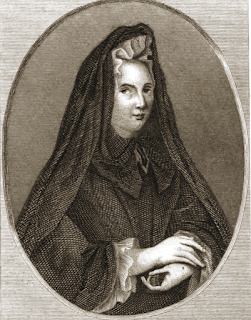 Reflections on
Reflections on
the Life of
Madame Jeanne de la Mothe Guyon.
Faithfulness in trial. Spiritual consolations.
In all the trials which she was thus called to endure, in the afflictions of her own person, and in the loss of her favorite son, it may be said of her, as it was of Job, — who is naturally called to mind by the story of her sufferings, — that she "sinned not, nor charged God foolishly." So far, at least, as the occurrences, which have now been mentioned, are concerned, the sincerity of the consecration which she had made of herself and of all her interests to God, had been tried; and through the grace of God it had not been found wanting.
It is possible, that the suggestion may arise in the minds of some, that God compensated her outward trials by giving an increase of inward consolation. And such was the case, undoubtedly, just so far as he found it necessary and desirable. He never fails, "to temper the wind to the shorn lamb." The hand which afflicted did not allow her to sink under the blow. And, accordingly, in giving some account of her feelings at this time, she speaks very fully of the supports and consolations she received, although they were mingled with some alternations of feeling, and with some states of inward experience, which she did not then fully understand.
"I had a great desire," she says, "for the most intimate communion with God. For this object, my heart went forth in continual prayer. He answered my supplication richly and deeply. The sensible emotion and joy which I experienced, were sometimes overwhelming. My heart was filled with love, as well as with joy; with that love which seeks another's will, and which is ready to relinquish and sacrifice its own.
"But this state of mind did not always continue. At other times, my mind seemed to be dry, arid, unemotional, and not fully' understanding the nature of his dealings with men, it seemed to me at such times that God, being offended. for something, had left me. The pain of his absence, (for such I supposed it to be ) was very great. Thinking it to be for some fault of mine that he had thus left me, I mourned deeply, — I was inconsolable. I did not then understand, that in the progress of the inward death, I must be crucified not only to the outward joys of sense, and to the pleasures of worldly vanity, but also, which is a more terrible and trying crucifixion, that I must die to the joys of God, in order that I might fully live to the will of God. If I had known that this was one of the states through which I must pass, in order to experience the full power of sanctifying grace, I should not have been troubled."
She had not yet reached that state, (that is to say, permanently and fully, although she had at times some touches of it, ) which may be denominated the Prayer of God's will; and which says continually, "I come to do thy will, O God." "It is any meat and drink to do the will of my heavenly Father." To this blessed will it is true that she was consecrated; and that in the fulfillment of this consecrating act, she lay patiently and passively on the altar of sacrifice. But I think it is equally true that she had not as yet experienced all the results which flow out of such a consecration, when it is attended by full faith, and when it has accomplished his work. As we have already expressed it in another passage, she was fully consecrated to the will of God, but had not fully found rest and union in the will of God.
— from The Life of Madame Guyon (1877), Volume 1, Chapter 11.

No comments:
Post a Comment